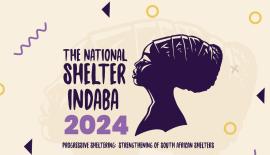
The 4th National Shelter Indaba has highlighted the urgent need for effective shelter solutions for survivors of gender-based violence (GBV).
The Department of Social Development, in partnership with the National Shelter Movement of South Africa (NSMSA), initiated the 4th National Shelter Indaba, currently underway in Sandton, Johannesburg.
This significant initiative coincides with the department’s month-long campaign, Social Development Month, which reflects on and showcases the department's programmes and services.
Director of Victim Empowerment and Prevention of Gender-Based Violence within the Department of Social Development, Sibusiso Malope, delivered a compelling opening speech, emphasising the critical need for effective shelter solutions for GBV survivors.
“Addressing gender-based violence is not just a moral imperative; it is a critical human rights issue that affects the well-being of individuals and the stability of our communities,” Malope said.
Under the theme: “Progressive Sheltering: Strengthening Shelters in South Africa”, this year’s indaba seeks to drive meaningful change in the fight against GBV by focusing on key pillars of the National Strategic Plan (NSP).
According to the World Health Organisation (WHO), globally, about one in three women (30%) have experienced physical or sexual violence in their lifetime, predominantly from intimate partners.
The statistics underscore the severity of the issue.
In Eastern and Southern Africa, this figure rises to 42%, which not only impacts individual survivors but also hinders family and community development, costing economies up to 4% of gross domestic product (GDP), as reported by the United Nations Economic Commission for Africa (UNECA).
“This crisis represents a fundamental violation of human rights and poses significant barriers to women’s participation in education and the labour market,” Malope emphasised.
He outlined the pivotal role of shelters in providing immediate safety and comprehensive support services.
“Shelters offer more than just a safe haven. They are essential in delivering trauma-informed counselling, legal assistance, and life skills training, which empower survivors to rebuild their lives,” he explained.
Malope said effective shelter programmes must include features such as secure locations, community integration, and cultural competence. He underscored the need for inclusive policies that ensure accessibility for marginalised populations, including LGBTQI [lesbian, gay, bisexual, transgender, queer/questioning (one's sexual or gender identity, and intersex individuals].
“We must ensure that our services are sensitive to the diverse backgrounds and needs of all survivors,” Malope said.
Staff training, including personnel being trained on trauma-informed practices to meet the unique needs of survivors, is also key.
“Well-trained staff are crucial for providing high-quality care and support,” Malope said.
Malope discussed the significance of data-driven practices, stating that regular monitoring and evaluation of shelter programmes is essential for improving services and ensuring accountability.
“By collecting and analysing data, we can better understand the effectiveness of our interventions and adapt to the needs of survivors,” he said.
Improving policies
Recent developments in policies and community responses to GBV in South Africa reflect government’s commitment to addressing this pressing issue through a multifaceted approach.
The Trafficking in Persons Act (TiP) aims to combat human trafficking, which often intersects with GBV, providing a legal framework to protect vulnerable individuals.
Additionally, the Domestic Violence Act (DVA) has been strengthened to enhance protections for survivors, ensuring they can access immediate support and legal recourse.
The Sexual Offences Act (SORMA) and the Criminal Law (Sexual Offences and Related Matters) Amendment Act have also been revised to impose stricter penalties on perpetrators, reinforcing the message that GBV will not be tolerated.
Malope emphasised the importance of these legislative frameworks.
“Robust laws are essential, but they must be accompanied by community-driven responses to be truly effective.
“Programmes like the Victim Support Services (VSS) and the National Gender-Based Violence Strategy (NGBV) are critical for ensuring that survivors receive holistic support.”
He further highlighted that community initiatives, including awareness campaigns and local support networks, play a vital role in shifting societal attitudes toward GBV.
“Engaging communities is key to prevention, as it fosters a culture of respect and accountability, ultimately contributing to the safety and empowerment of all individuals,” Malope said.
The two-day Indaba features keynote addresses, panel discussions, and opportunities for collaboration among government departments, Chapter 9 institutions, and civil society organisations, policymakers and advocates.
Topics include innovations in shelter services, mental health support for survivors and community engagement strategies.
“This conference is a call to action for all of us to work collaboratively in creating safer communities,” Malope said.
As participants engage in discussions and share best practices over the two-day initiative, the NSMSA aims to develop actionable strategies to enhance shelter services for survivors of GBV, reinforcing the importance of a survivor-centred approach in responding to this pervasive issue.
The National Shelter Movement of South Africa plays a pivotal role in the implementation of Pillar 4 of the NSP on GBVF, and is an umbrella body for 99 shelters across the country.
These shelters provide essential care and support services for individuals affected by GBV, offering safety, counselling, healing, empowerment for survivors as they rebuild their lives, and interrupting and breaking the cycle of violence. – SAnews.gov.za


